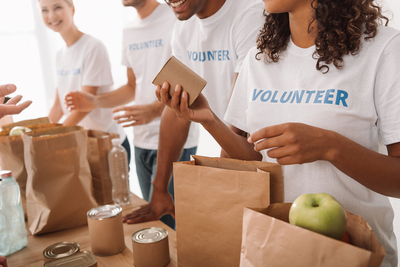Recovering from addiction is an intensive process for which there is no easy solution; however, certain things do facilitate recovery, including medication, behavioral counseling, treatment for co-occurring mental health issues, and long-term follow-ups aimed at relapse prevention.
While strong support networks have also been associated with recovery, a growing body of evidence points to the paramount value of connectedness. One way to boost your support network as a recovering addict is to volunteer. Here’s a closer look at the role volunteering can play in promoting lasting sobriety as part of substance abuse treatment.

Addicts can improve their own lives by helping to improve the lives of others.
From Addiction to Connection
Addiction is often caused by and leads to a lack of connection with a positive support network. This can be a vicious cycle; as addicts increasingly become involved in substance abuse, they may begin to shut out family members and friends who don’t enable them. The result is a life surrounded by people who add to their problem.
While cutting connections with loved ones can be disenfranchising, working to build positive connections can have the opposite effect. Proposes mental health online resource Psych Central: “Ultimately, only you can walk the path of recovery, but the support groups and people you have around you are a wonderful and incredibly essential tool in helping you help yourself.”
Enter volunteering.
Making a Difference by Volunteering
According to a survey of more than 800 people in recovery groups conducted by researchers at Sheffield Hallam University, “community-led peer support and volunteering can be more effective in maintaining recovery from drug or alcohol addiction than medical interventions.”
Specifically, the study set out to investigate the motivations and perspectives of people recovering from substance abuse. Its conclusions were significant. A whopping near-80 percent of people in long-term recovery (classified as five years or more) had been volunteering in community groups throughout their journeys to recovery.
Indeed, the benefits of volunteering are strong for all people, with addicts, in particular, positioned for compelling gains. In addition to building connections with others, volunteering also helps shift the focus from inward-facing to outward-facing, engenders feelings of purpose and power, and restores community engagement.
Meanwhile, a 2013 Health and Volunteering Study from UnitedHealth Group indicates an even more basic reason to volunteer. People who volunteer feel better—physically, mentally, and emotionally. Volunteering even has practical benefits in helping people develop sought-after professional competencies, including everything from time management to teamwork skills.

Do you have the right people on your team?
While volunteering in any capacity is accompanied by beneficial outcomes, research further points to the upsides that occur when recovering addicts help each other. According to research published in the Journal of Studies on Alcohol, “Recovering alcoholics who help other alcoholics maintain long-term sobriety following formal treatment are themselves better able to maintain their own sobriety.”
A Fundamental Message
Said Professor David Best, who headed up the Hallam study, “The fundamental message is that people can and do recover, and when they do, they effect a life transformation that is dramatic and has significant positive consequences for their families, communities, and society as a whole….As people grow in their recovery, they increasingly act as good citizens who contribute, care, and work. These are productive and creative people who pay taxes and do innovative and positive things—if society gives them a chance.”
In other words, the path to recovery can be viewed somewhat as a self-fulfilling prophecy. Addicts who commit to making a contribution by becoming involved in the communities around them do make a contribution and in doing so support their own recovery and well-being. At the same time, those who do not take these steps miss the chance to reframe themselves and their lives this way.
The takeaway, according to Best, is that there are profound advantages found in “moving the recovery emphasis away from medical interventions and towards the role community engagement, well-being, and support groups can play in securing long-term recovery from drug and substance abuse.”
We’re Here To Help
To learn more about the value of holistic substance abuse treatment programs, along with how Harris House has been helping addicts on the path to recovery for more than 50 years, contact us today.







